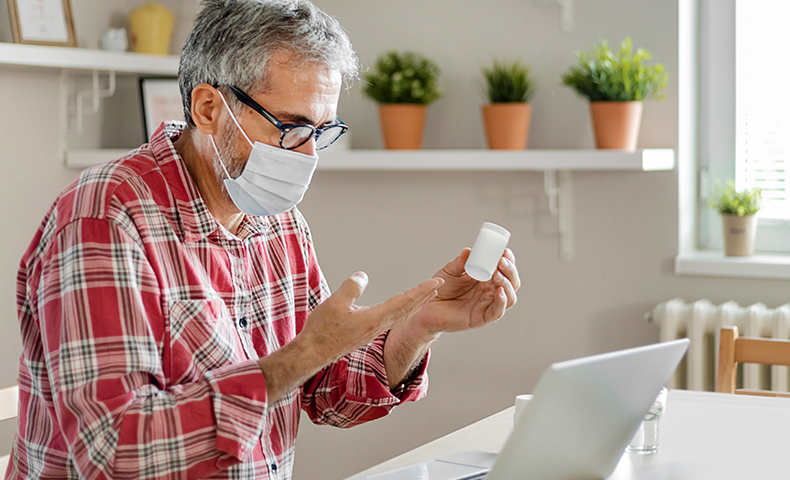
[Image description: A man is wearing a mask and holding up a bottle of medication as he has a video visit with a doctor.]
As the COVID-19 pandemic continues, it’s likely that you or someone you know may have had the infection. While a positive test result may feel overwhelming, it can be helpful (and important) to know what to do. Here are some guidelines from the Centers for Disease Control and Prevention (CDC):
To start, it’s best for you to stay home unless you have a medical emergency. You’ll also want to isolate yourself from other members of your household so that you minimize the risk of spreading the virus.
You should isolate if:
- You have COVID-19 symptoms (such as cough, fever, shortness of breath or new loss of taste or smell) and can recover at home.
- You tested positive for COVID-19, even if you’re not showing symptoms (asymptomatic).
It’s also good to inform your close contacts (people you saw in-person before you had symptoms or tested positive) that they may have been exposed.
You can isolate by:
- Tracking your symptoms at home. If you have an emergency health symptom such as trouble breathing or chest pain, seek emergency medical care immediately.
- Staying in a separate room and using a different bathroom from the other people in your household (if possible).
- Avoiding contact with people and pets in your home.
- Not sharing personal items such as towels or cups.
- Wearing a mask when you can’t avoid being around others.
You can take care of yourself by:
- Staying hydrated and getting rest.
- Washing your hands often, covering your coughs and sneezes and disinfecting surfaces frequently.
- Having over-the-counter medications like acetaminophen (Tylenol) when needed.
- Keeping in touch with your doctor and following their guidance. If you need in-person medical care, call ahead before visiting. Doctors on LiveHealth Online are also available 24/7 to provide support for non-emergency concerns.
Ending isolation
If you did have symptoms when you were diagnosed with COVID-19, you can be around people if it’s been:
- At least 10 days after symptoms first appeared, and
- At least 24 hours without a fever (and no fever-reducing medication such as Tylenol) and
- Other symptoms are improving.
The loss of taste or smell may last longer than recovery and does not affect when you can be around others.
If you did not show any symptoms when you were diagnosed with COVID-19 and have not developed any during your isolation, you can be around people 10 days after your first positive test.
If you have a weakened immune system (immunocompromised) due to a health condition or medication, you may need to stay home for longer than 10 days. It’s best to talk to your healthcare provider before ending isolation.
Remember, you can talk to a doctor on LiveHealth Online anytime if you have questions or need advice. Doctors can assess symptoms, screen for COVID-19, prescribe medication and provide next steps for quarantine, care or isolation.
Recommended Posts


